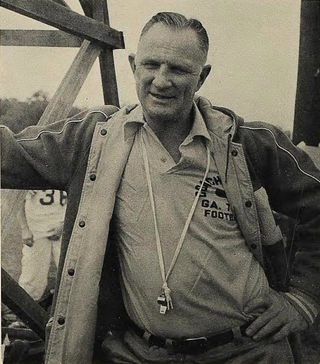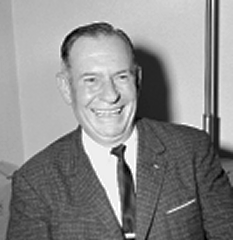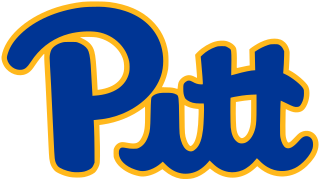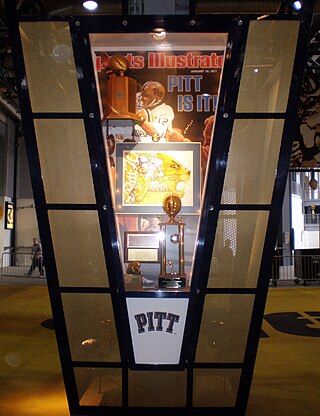
The Sugar Bowl is an annual American college football bowl game played in New Orleans, Louisiana. Played annually since January 1, 1935, it is tied with the Orange Bowl and Sun Bowl as the second-oldest bowl games in the country, surpassed only by the Rose Bowl Game.

Robert Lee Dodd was an American college football player and coach, college baseball coach, and college athletics administrator. He served as the head football coach at Georgia Tech from 1945 to 1966, compiling a record of 165–64–8. His teams won consecutive Southeastern Conference (SEC) title in 1951 and 1952, and his 1952 Georgia Tech Yellow Jackets football team won the 1953 Sugar Bowl and was recognized as a national champion by a number of selectors though they finished second behind Michigan State in both major polls. Dodd was also Georgia Tech's head baseball coach from 1932 to 1939, tallying a mark of 43–64–2, and the school's athletic director from 1950 until 1976. All together, Dodd served Georgia Tech 57 years in various capacities.

Samuel Marvin Griffin, Sr. was an American politician from the U.S. state of Georgia.

The Georgia Tech Yellow Jackets is the name used for all of the intercollegiate athletic teams that represent the Georgia Institute of Technology, located in Atlanta, Georgia. The teams have also been nicknamed the Ramblin' Wreck, Engineers, Blacksmiths, and Golden Tornado. There are eight men's and seven women's teams that compete in the National Collegiate Athletic Association (NCAA) Division I athletics and the Football Bowl Subdivision. Georgia Tech is a member of the Coastal Division in the Atlantic Coast Conference.

Blake Ragsdale Van Leer was an engineer and university professor who served as the fifth president of Georgia Institute of Technology from 1944 until his death in 1956.

The Georgia Tech Yellow Jackets football program represents the Georgia Institute of Technology in the NCAA Football Bowl Subdivision in the sport of American football. The Yellow Jackets college football team competes in the Football Bowl Subdivision (FBS) of the National Collegiate Athletic Association (NCAA) and the Coastal Division of the Atlantic Coast Conference (ACC). Georgia Tech has fielded a football team since 1892 and, as of 2020, has an all-time record of 754-538-43 through the 2022 season. The Yellow Jackets play in Bobby Dodd Stadium at Historic Grant Field in Atlanta, Georgia, holding a stadium max capacity of 55,000.

The Pittsburgh Panthers football program is the intercollegiate football team of the University of Pittsburgh, often referred to as "Pitt", in Pittsburgh, Pennsylvania. Traditionally the most popular sport at the university, Pitt football has played at the highest level of American college football competition, now termed the NCAA Division I Football Bowl Subdivision, since the beginning of the school's official sponsorship of the sport in 1890. Pitt competes as a member of the Atlantic Coast Conference (ACC).
The 1956 Rose Bowl was the 42nd edition of the college football bowl game, played at the Rose Bowl in Pasadena, California, on Monday, January 2. The Michigan State Spartans of the Big Ten Conference defeated the UCLA Bruins of the Pacific Coast Conference, 17–14. Michigan State halfback Walt Kowalczyk was named the Player of the Game.
The 1956 Sugar Bowl featured the 7th ranked Georgia Tech Yellow Jackets, and the 11th ranked Pittsburgh Panthers. The game was played on January 2, since New Year's Day was a Sunday. Much controversy preceded the 1956 Sugar Bowl. Segregationists and Georgia governor Marvin Griffin used all his political power in an attempt to keep Pitt fullback/linebacker Bobby Grier from playing because he was black. But ultimately, Bobby Grier played making this the first integrated Sugar Bowl and is the first integrated bowl game in the Deep South.

The 1976 Pittsburgh Panthers football team represented the University of Pittsburgh in the 1976 NCAA Division I football season and is recognized as a consensus national champion. Pitt was also awarded the Lambert-Meadowlands Trophy as the best Division I team in the East. The Panthers played their home games at Pitt Stadium in Pittsburgh, Pennsylvania.
The 1981 Pittsburgh Panthers football team represented the University of Pittsburgh in the 1981 NCAA Division I-A football season. The one-loss Panthers were selected as national champion by NCAA-designated major selector National Championship Foundation and also by Montgomery Full Season Championship. The school does not claim a national championship for this season.
The 1982 Sugar Bowl was the 48th edition of the college football bowl game, played at the Louisiana Superdome in New Orleans, Louisiana, on Friday, January 1. Part of the 1981–82 bowl game season, it matched the #2 Georgia Bulldogs of the Southeastern Conference (SEC), the defending national champions, and the #8 Pittsburgh Panthers, an independent. The slight underdog Panthers won the game 24–20.
American football in Western Pennsylvania, featuring the city of Pittsburgh and surrounding areas, has had a long and storied history, dating back to the early days of the sport. All levels of football, including high school football and college football, are followed passionately, and the area's National Football League (NFL) team, the Pittsburgh Steelers, is consistently one of the sport's most popular teams. Many of the NFL's top stars have come from the region as well, especially those that play quarterback, earning Western Pennsylvania the nickname "Cradle of Quarterbacks".
The 1977 Sugar Bowl was the 43rd edition of the college football bowl game, played at the Louisiana Superdome in New Orleans, Louisiana, on Saturday, January 1. Part of the 1976–77 bowl game season, it matched the top-ranked Pittsburgh Panthers and the #5 Georgia Bulldogs, champions of the Southeastern Conference (SEC). Independent Pittsburgh won 27–3, and were consensus national champions.
The 1955 Pittsburgh Panthers football team represented the University of Pittsburgh in the 1955 college football season. The Panthers were led by first-year head coach John Michelosen and played their home games at Pitt Stadium in Pittsburgh, Pennsylvania.
The 1956 Georgia Tech Yellow Jackets football team was an American football team that represented Georgia Tech as a member of the Southeastern Conference (SEC) during the 1956 NCAA University Division football season. In their 12th year under head coach Bobby Dodd, the team compiled an overall record of 10–1, with a mark of 7–1 in conference play, and finished second in the SEC.

The 2016 Georgia Tech Yellow Jackets football team represented the Georgia Institute of Technology in the 2016 NCAA Division I FBS football season. The Yellow Jackets were led by ninth-year head coach Paul Johnson and played their home games at Bobby Dodd Stadium. They were a member of the Coastal Division in the Atlantic Coast Conference.
The 1955 Georgia Tech Yellow Jackets football team was an American football team that represented Georgia Tech as a member of the Southeastern Conference (SEC) during the 1955 college football season. In their 11th year under head coach Bobby Dodd, the team compiled an overall record of 9–1–1, with a mark of 4–1–1 in conference play, and finished third in the SEC.

The 2020 Georgia Tech Yellow Jackets football team represented the Georgia Institute of Technology during the 2020 NCAA Division I FBS football season. The Yellow Jackets were led by second-year head coach Geoff Collins. They played their home games at Bobby Dodd Stadium and competed as a member of the Atlantic Coast Conference (ACC).

The 2022 Georgia Tech Yellow Jackets football team represented the Georgia Institute of Technology during the 2022 NCAA Division I FBS football season. The Yellow Jackets played their home games at Bobby Dodd Stadium in Atlanta, Georgia, and competed as members of the Atlantic Coast Conference. They were led by Geoff Collins until his firing early in the season and then were subsequently led by interim coach Brent Key.








